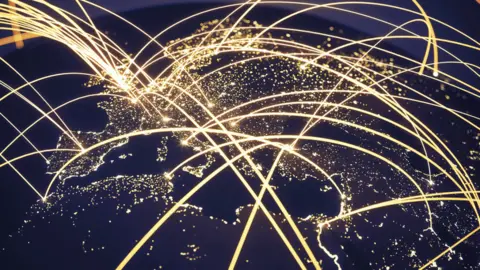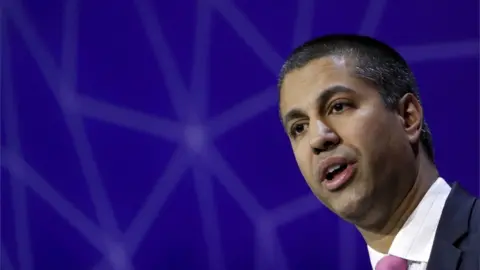Net neutrality debate 'controlled by bots'
 Getty Images
Getty ImagesMore than 80% of the comments submitted to a US regulator on the future of net neutrality came from bots, according to researchers.
Data analytics company Gravwell said only 17.4% of the comments were unique.
Most of the 22 million comments submitted to the Federal Communications Commission over the summer had been against net neutrality, it suggested.
One expert said the findings posed a risk to future polls.
The Trump administration wants to roll back the pro-net-neutrality rules that were voted for under President Obama.
The analytics team behind the latest bot research said most comments had been submitted in bulk, with many coming in batches with obviously incorrect information.
It said this indicated they had not been submitted by individual members of the public.
Porn hub
More than one million comments in July had claimed to have a pornhub.com email address, which had raised suspicions, it said.
People who submitted comments directly to the FCC website had been "overwhelming in support of net neutrality regulations", lead researcher Corey Thuen said.
In contrast, those that were submitted via the FCC-approved platform for bulk submissions had been anti-net neutrality.
Mr Thuen said: "Seeing a clear difference of opinion between bulk submitted comments versus those that came in via the FCC comment page, we're forced to conclude that either the nature of submission method has some direct correlation with political opinion, or someone is telling lies on the internet."
 Reuters
ReutersPresident Trump appointed a net-neutrality opponent, Ajit Pai, as FCC chairman in January, and he began the process of dismantling the current rules in May and invited the public to submit comments over the summer.
The decision has proved controversial with campaigners who fought hard to preserve what they regard as the freedom of the internet.
By contrast, telecoms companies say they need to be able to decide which traffic to prioritise in order to provide the best service to consumers.
Many fear that once the rules are reversed, internet service providers (ISPs) will start to block or restrict some data while those willing to pay will be given "fast lanes".
The FCC has declined to comment, saying it does not address specific filings.
Bot writers
Prof Phil Howard, of the Oxford Internet Institute, said of the findings: "This is an extreme example of what happens when a government initiates comment sections, and it does open up questions about what other public consultations have been influenced in this way.
"It is going to be increasingly rare that public organisations solicit anonymous opinions in this way."
It is difficult though to work out who could be behind the bots.
"Bot writers don't talk about who their clients are and in the US, while political actors have to disclose if they have a social media consultancy, if that agency then uses sub-contractors, the paper trail disappears quickly."
It is not the first time that the net neutrality debate has been accused of being taken over by bots.
Three separate analyses in May suggested that more than 400.000 comments with similar wording had been detected.